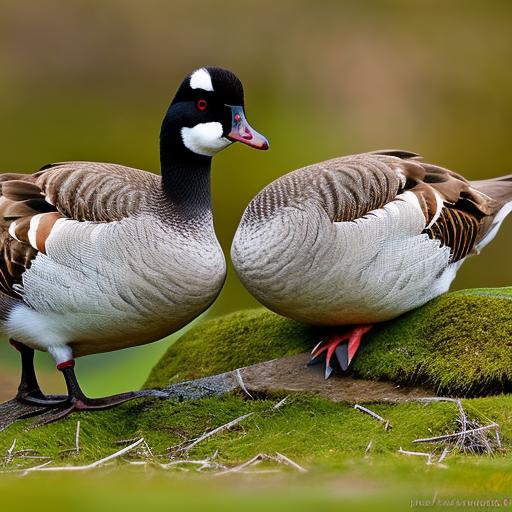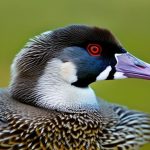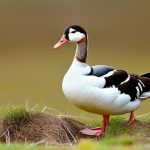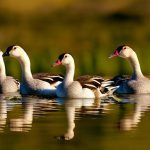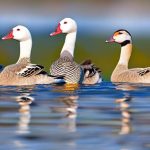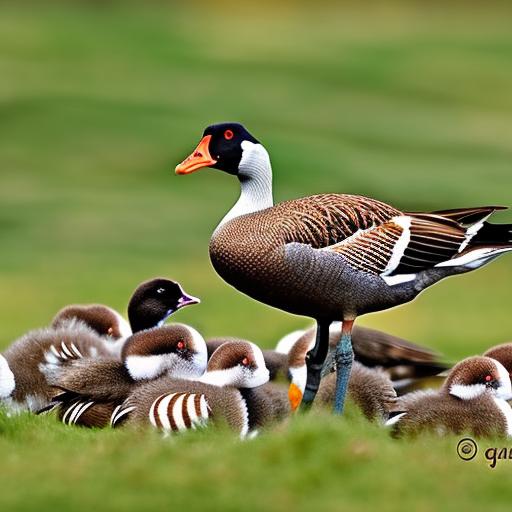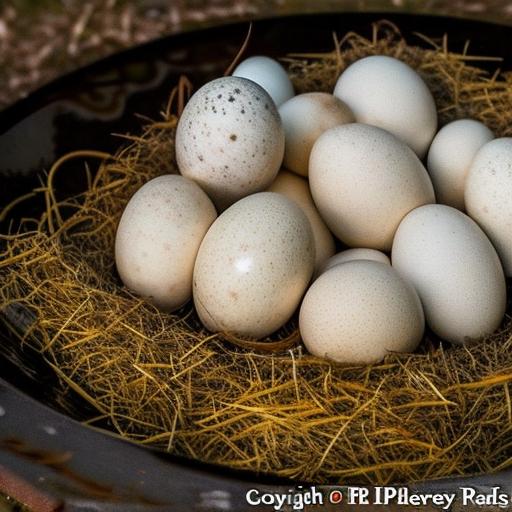Geese have a long history in the United Kingdom, dating back to ancient times. They were originally domesticated for their meat, eggs, and feathers, and were an important part of agricultural practices. Today, geese continue to play a significant role in UK agriculture, providing not only food but also serving as effective weeders and grazers.
Geese were introduced to the UK by the Romans, who brought them over from their native land of Egypt. The Romans valued geese for their meat and feathers, and they quickly spread throughout the country. Over time, different breeds of geese were developed to suit various purposes and climates.
The importance of geese in agriculture cannot be overstated. They are excellent grazers and can efficiently convert grass into meat and eggs. They are also effective weeders, as they will happily eat a wide variety of plants, including many that are considered pests. Additionally, geese are known for their strong maternal instincts and make excellent foster parents for other poultry species.
Key Takeaways
- Geese breeds in the UK are diverse and can be categorized into domesticated, rare, ornamental, and breeds for meat and egg production.
- Popular breeds of geese in the UK include the Embden, Toulouse, and Chinese geese.
- Domesticated geese breeds in the UK are the result of selective breeding for specific traits such as size and egg production.
- Rare breeds of geese in the UK include the Brecon Buff, Pilgrim, and West of England geese.
- Geese breeds for meat production in the UK include the Pekin and the Embden, while breeds for egg production include the Chinese and the Sebastopol geese.
Popular Breeds of Geese in the UK
There are several popular breeds of geese in the UK, each with its own unique characteristics and qualities. Some of the most well-known breeds include Toulouse geese, Embden geese, Chinese geese, and African geese.
Toulouse geese are one of the largest domesticated goose breeds and are known for their impressive size and weight. They have a calm temperament and are often raised for meat production. Toulouse geese have a distinctive gray plumage and a large dewlap under their chin.
Embden geese are another popular breed in the UK. They are large, white geese with a gentle disposition. Embdens are primarily raised for meat production but can also be kept for ornamental purposes. They are known for their excellent foraging abilities and adaptability to different climates.
Chinese geese are easily recognizable by their unique appearance. They have a long, slender neck and a prominent knob on their forehead. Chinese geese are known for their loud honking and are often kept as guard animals due to their alert nature. They are also good egg layers and can produce a large number of eggs each year.
African geese are a smaller breed of goose, but they are known for their excellent egg-laying abilities. They have a calm temperament and are often kept for both meat and egg production. African geese have a grayish-brown plumage and a distinctive knob on their forehead.
Domesticated Geese Breeds in the UK
In addition to the popular breeds mentioned above, there are also several domesticated goose breeds that are well-suited to UK farming conditions. These breeds include Brecon Buff geese, Pilgrim geese, and Sebastopol geese.
Brecon Buff geese are a relatively new breed that was developed in the 1980s. They are known for their striking buff-colored plumage and gentle temperament. Brecon Buff geese are excellent grazers and can thrive on pasture-based systems. They are primarily raised for meat production but can also be kept for ornamental purposes.
Pilgrim geese are a small to medium-sized breed that is known for its excellent foraging abilities. They have a calm temperament and are often used as weeders in orchards and vineyards. Pilgrim geese are also good egg layers and can produce a moderate number of eggs each year.
Sebastopol geese are easily recognizable by their unique feathering. They have long, curly feathers that give them a distinctive appearance. Sebastopol geese are primarily kept for ornamental purposes but can also be raised for meat production. They have a calm temperament and are known for their friendly nature.
Rare Breeds of Geese in the UK
There are several goose breeds in the UK that are considered rare and are listed on the Rare Breeds Survival Trust (RBST) list. These breeds include the Shetland goose, the West of England goose, and the Orkney goose.
The RBST is an organization dedicated to preserving and promoting rare and native breeds of livestock in the UK. The inclusion of these goose breeds on the RBST list highlights their importance in terms of genetic diversity and cultural heritage.
Preserving rare breeds is crucial for maintaining genetic diversity within livestock populations. Rare breeds often possess unique traits that can be beneficial for future breeding programs, such as disease resistance or adaptability to specific environments. Additionally, preserving rare breeds helps to maintain cultural traditions and heritage associated with these animals.
Geese Breeds for Meat Production in the UK
When it comes to meat production, certain goose breeds are more suitable than others. Meat breeds are typically larger in size and have a higher meat-to-bone ratio. Some recommended goose breeds for meat production in the UK include Toulouse geese, Embden geese, and Pilgrim geese.
Toulouse geese are one of the most popular choices for meat production due to their large size and impressive weight gain. They have a calm temperament and are known for their excellent meat quality. Toulouse geese can reach weights of up to 20 pounds or more, making them ideal for meat production.
Embden geese are also commonly raised for meat production. They are large, white geese with a gentle disposition. Embdens have a high meat-to-bone ratio and produce tender, flavorful meat. They are efficient grazers and can convert grass into meat efficiently.
Pilgrim geese, although smaller in size compared to Toulouse and Embden geese, are also suitable for meat production. They have a calm temperament and excellent foraging abilities. Pilgrim geese produce lean, flavorful meat that is highly prized by chefs and consumers.
Geese Breeds for Egg Production in the UK
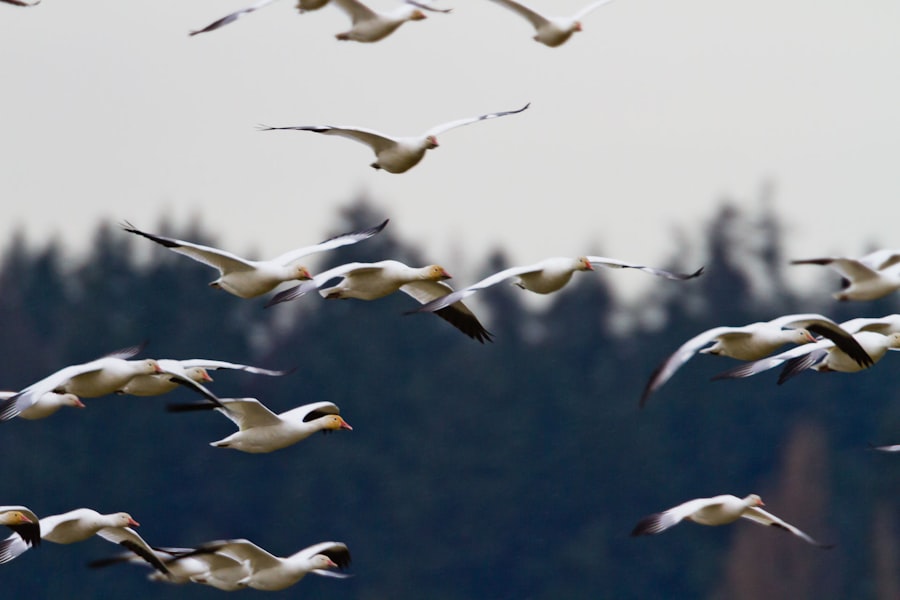
If you are looking to raise geese for egg production, there are certain breeds that are more suitable for this purpose. Egg-laying breeds are typically smaller in size and have a higher egg production rate. Some recommended goose breeds for egg production in the UK include African geese, Pilgrim geese, and Chinese geese.
African geese are known for their excellent egg-laying abilities. They can produce a large number of eggs each year, with some individuals laying up to 60 eggs or more. African geese have a calm temperament and are relatively easy to care for.
Pilgrim geese, in addition to being good meat birds, are also good egg layers. They can produce a moderate number of eggs each year, typically around 30-40 eggs. Pilgrim geese have a calm temperament and are known for their excellent foraging abilities.
Chinese geese are also good egg layers and can produce a moderate number of eggs each year. They have a calm temperament and are relatively easy to care for. Chinese geese are known for their loud honking and can serve as effective guard animals.
Ornamental Geese Breeds in the UK
If you are looking to keep geese for ornamental purposes, there are several breeds that are well-suited to this role. Ornamental breeds are typically chosen for their unique appearance and distinctive plumage. Some recommended goose breeds for ornamental purposes in the UK include Sebastopol geese, Pilgrim geese, and Chinese geese.
Sebastopol geese are easily recognizable by their unique feathering. They have long, curly feathers that give them a distinctive appearance. Sebastopol geese are primarily kept for ornamental purposes and can be a beautiful addition to any flock.
Pilgrim geese, in addition to being good meat and egg birds, are also popular for their ornamental qualities. They have a calm temperament and are known for their striking appearance. Pilgrim geese can come in a variety of colors, including white, gray, and buff.
Chinese geese, with their long, slender necks and prominent knobs, are also popular for ornamental purposes. They have a unique appearance and can be a focal point in any flock. Chinese geese are known for their loud honking and can serve as effective guard animals.
Characteristics of Different Geese Breeds in the UK
Geese breeds in the UK vary in terms of size, weight, color variations, temperament, and behavior. Understanding these characteristics can help you choose the right breed for your specific needs.
Size and weight: Geese breeds can vary significantly in terms of size and weight. Toulouse geese are one of the largest domesticated goose breeds and can reach weights of up to 20 pounds or more. African geese are smaller in size but are known for their excellent egg-laying abilities.
Color variations: Geese breeds come in a variety of colors, including gray, white, buff, and brown. Toulouse geese have a distinctive gray plumage, while Embden geese are large, white geese. Brecon Buff geese have a striking buff-colored plumage.
Temperament and behavior: Geese breeds also differ in terms of temperament and behavior. Some breeds, such as Toulouse geese and Embden geese, have a calm temperament and are relatively easy to handle. Chinese geese are known for their loud honking and alert nature.
Geese Breeds Suitable for Smallholdings in the UK
If you have a smallholding or limited space for raising geese, there are certain breeds that are more suitable for this purpose. These breeds typically have lower space and feeding requirements and are easier to manage. Some recommended goose breeds for small-scale farming in the UK include Pilgrim geese, Brecon Buff geese, and Sebastopol geese.
Pilgrim geese are a small to medium-sized breed that is well-suited to smallholdings. They have a calm temperament and are relatively easy to handle. Pilgrim geese are good foragers and can thrive on pasture-based systems.
Brecon Buff geese are also suitable for small-scale farming. They have a gentle temperament and are known for their excellent grazing abilities. Brecon Buff geese can adapt well to different environments and can be raised on smaller plots of land.
Sebastopol geese, although primarily kept for ornamental purposes, can also be suitable for smallholdings. They have a calm temperament and are relatively easy to manage. Sebastopol geese have lower space requirements compared to larger breeds such as Toulouse or Embden geese.
Caring for Geese Breeds in the UK
Caring for geese breeds in the UK involves providing them with appropriate housing, feeding, and healthcare. Geese have specific needs that must be met in order to ensure their health and well-being.
Housing and fencing needs: Geese require secure housing that protects them from predators and provides shelter from the elements. A sturdy goose house with adequate ventilation is essential. Fencing should be tall enough to prevent escape and should be buried underground to prevent predators from digging under.
Feeding and watering requirements: Geese are grazers and require access to fresh grass or pasture. They should also be provided with a balanced diet that includes grains, vegetables, and access to clean water at all times. Grit should also be provided to aid in digestion.
Health and hygiene considerations: Geese require regular health checks and vaccinations to prevent diseases. They should be provided with a clean living environment and regular access to fresh water for bathing. Regular cleaning of the goose house and removal of droppings is also important for maintaining good hygiene.
Geese breeds in the UK have a rich history and continue to play an important role in agriculture. From popular breeds such as Toulouse and Embden geese to rare breeds listed on the RBST, there is a wide variety of geese breeds to choose from. Whether you are looking for meat production, egg-laying, ornamental purposes, or small-scale farming, there is a breed that will suit your needs.
Choosing the right breed of geese is crucial for success in raising them. Consider factors such as size, temperament, and purpose when selecting a breed. Additionally, proper care and management are essential for the health and well-being of your geese.
If you have a farm or smallholding, consider adding geese to your flock. They are not only valuable for their meat, eggs, and feathers but also serve as effective weeders and grazers. Geese can be a rewarding addition to any farm or smallholding, providing both practical benefits and enjoyment.
If you’re interested in learning more about breeds of geese in the UK, you might also find this article on “Where to Put Your Chicken Coop” from Poultry Wizard helpful. It provides valuable insights on the ideal location for your coop, taking into consideration factors such as sunlight, drainage, and predator protection. Understanding the importance of a well-placed coop is essential for the overall health and safety of your geese. Check out the article here to ensure you create the perfect environment for your feathered friends.
FAQs
What are the different breeds of geese in the UK?
There are several breeds of geese in the UK, including the Embden, Toulouse, Chinese, African, and the popular domesticated breed, the Greylag.
What is the size of the Embden goose?
The Embden goose is a large breed, with males weighing up to 14 kg and females weighing up to 10 kg.
What is the origin of the Toulouse goose?
The Toulouse goose originated in France and was brought to the UK in the 19th century.
What is the distinguishing feature of the Chinese goose?
The Chinese goose is known for its distinctive knob on its forehead, which is more prominent in males than females.
What is the size of the African goose?
The African goose is a medium-sized breed, with males weighing up to 7 kg and females weighing up to 5 kg.
What is the history of the Greylag goose?
The Greylag goose is a domesticated breed that is believed to be the ancestor of all domesticated geese. It was first domesticated in Europe over 2,000 years ago.
Meet Walter, the feathered-friend fanatic of Florida! Nestled in the sunshine state, Walter struts through life with his feathered companions, clucking his way to happiness. With a coop that’s fancier than a five-star hotel, he’s the Don Juan of the chicken world. When he’s not teaching his hens to do the cha-cha, you’ll find him in a heated debate with his prized rooster, Sir Clucks-a-Lot. Walter’s poultry passion is no yolk; he’s the sunny-side-up guy you never knew you needed in your flock of friends!

